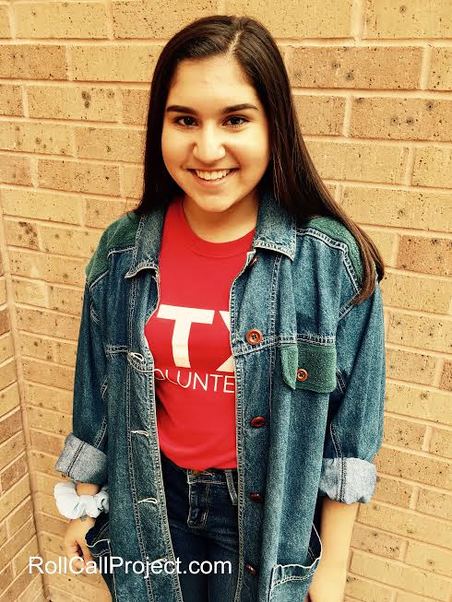 High School Student Hispanic + White Female Q: What do you have in common with your teachers? A: Although the Rio Grande Valley has a population of 1.5 Million people, the world I grew up in was pretty small. From ages 6 to 11, the one thing I had in common with my teachers was my gender. Having strong female role models during some of the most formative years of my life has shaped who I am today. They understood the stigma surrounding “bossy girls” before I even knew what connotation the word “bossy” held. They nurtured my leadership and drive instead of shutting down my “bossiness”. I never saw this as anything of importance until I got to middle school where the first male teacher I ever had pointed to me as I was planning our group's next step and said, “Well, you’re quite the bossy one. Aren’t you?” I could tell by his voice that it was not a compliment. My whole life, my leadership had always been accepted if not encouraged, but this man who did not understand why young girls should be encouraged in this way, discouraged my initiative and drive for the rest of the year. Throughout my early school years, I was exposed to a lot of diversity. If my teachers were not Hispanic, they were Colombian or Irish or even African American. This allowed me to grow up in a world that was accepting of differences and taught me how to deal with people who didn't always look like me. Although this was a great skill to develop, it could never match what I learned when I finally had a teacher that looked like me. In my first year of High School, I really struggled finding my “Latinx Identity”. I wanted to embrace my culture but I didn't speak Spanish and along with the fact that I looked white, it made it hard to feel like I could really check that Hispanic box. Sophomore year was when I finally had a teacher who was like me--dark haired, had a lighter complexion, and didn't speak Spanish, but still EMBRACED a Latin Identity. For so long, I felt rejected by a world I didn't even know and this gave me hope of one day belonging. She taught me that when we exist in two worlds, we must find a way to make our own and even when you feel like you do not belong entirely to one culture, it is still yours to claim. Growing up around teachers who shared my race, identity and gender made me not only feel represented in the world, but it made me feel understood and as a young girl, that was all I could ask for. Q: Does it matter that students and teachers have things in common? A: One of my favorite quotes from Gloria Anzaldúa says, “The US Mexican Border es una herida abierta where the third world grates against the first and bleeds. And before a scab forms it hemorrhages again, the lifeblood of two worlds merging to form a third country - a border culture.” This border culture is a mix of English and Spanish. It is Mexican ancestry with the American mainstream. It is existing in two different worlds, but never belonging to either. It wasn't until my freshman year that I had the first teacher who introduced to a new concept : Pride of Place. This man, Mr.Ozuna, walked into our class on the first day of school and said “I went to Yale for college and a lot of people ask me, ‘if you went to Yale, why would you come back and teach at Memorial High School?’ The question I ask you is why don’t you all deserve to have a teacher that was educated at Yale?”. This was a very defining moment in my life. I realized that the problem in our community wasnt that we didn't want opportunities, but that we felt we didn't deserve them. This mentorship was based on more than the fact that he looked like me with his dark hair and hispanic features (which I shared with most of my teachers all my life), but that he understood our “border culture” and taught me how I could use my voice to help people understand our community better. When you look up the Rio Grande Valley, 9 times out of 10 you will find some negative stereotype or false narrative perpetuated by people who do not know our community like we do. We, as a community, are constantly underestimated and misunderstood which is a hard concept to grasp for a young girl growing up here. Growing up, I constantly had to listen to people say things like “there’s no opportunities here” or, “I can’t wait to leave the Valley”. For the first 14 years of my life, I had never been exposed to any teacher or anyone who really loved this place. Being so young, it was hard living in a world that taught me to not be proud of where I come from. Simply having this culture in common made me not only want more for my community, but made me feel like we deserve more. It allowed me to break out of the stigma that I couldn't be successful here and start making my own success. For me, having things in common with my teachers is important because I no longer feel like I am alone. And once you feel like you have a community of people supporting you, you are unstoppable. Sydney is the founder of @thergvmatters. Her #successwithoutborders interview series (podcast coming soon!) encourages youth involvement in her community and aims to inspires people to be proud of their Rio Grande Valley roots. Join in her activism and connect with her on Twitter @sydramon. Photo (c) 2017 Kristin Leong
0 Comments
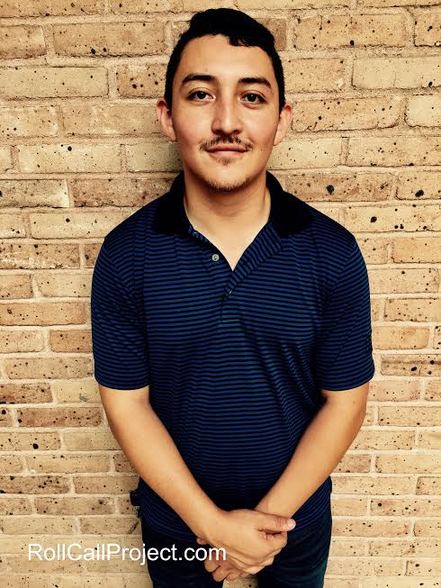 University Student High School History Teacher-in-Training Mexican DREAMer Heterosexual Male First in Family to Attend College Q: What do you have in common with your teachers? A: Growing up in the southmost part of the country, I believe that I have had a unique experience. The majority of my teachers have been Mexican Americans. I sometimes see myself reflected in their stories about their childhood. We share the same culture and traditions. In Christmas time we all look forward to eating tamales and sharing time with our large, extended families. Although most of my grade school teachers looked similar to me, in college at the University of Texas Rio Grande Valley things changed. Suddenly I was surrounded with Anglo and Asian professors. Sometimes it was difficult to communicate and relate with them. They would tend not to understand the culture of the students. However, I always felt I had home field advantage because they were the outsiders. Recently the University has doubled their efforts to hire Latino professors. Although we do share a common language and Hispanic heritage we are very different. Currently I have a Cuban, a Cuban American, and a Puerto Rican professor. Our customs are very different but it is always interesting to learn about their traditions. I usually find myself making connections between their traditions and mine. I’ve also had Mexican and Mexican-American professors. I can relate more with these professors but even then, they are usually not native to the valley. They come from California, Chicago, and different parts of Mexico. Ultimately, I have always looked up to the few professors who are from the area and are teaching in the area. They usually share the same stories and “have been there done that”. Disclaimer: This is not to say that teachers from other backgrounds and cultures are bad teachers. At the end of the day they have all been great teachers. A teacher’s role is to teach, and I have learned… A LOT! Q: Does it matter that students and teachers have things in common? A: I think it is very important to have that connection between student and teacher. As a future teacher, I want to build that rapport with my students. I know that in the question above I focused on ethnicity a lot because that is what came to mind at first. But thinking about it we do not have to be from the same ethnic background, race, religion, sex or socioeconomic status to have things in common. The key is to respect and celebrate each other’s differences rather than point them out or try to hide them. My whole teaching philosophy is centered around the ability to celebrate diversity and be proud of the differences in the classroom and in our community. We live in a great country that even with all its flaws, it still remains the land of opportunity for all, although some have more opportunities than others. But that is what education is for and that is why I want to be an educator. I want to give all students the tools necessary to have an opportunity to succeed and close the achievement gap. Once again this is where having something in common comes to play. I am part of that achievement gap and have lacked opportunity so I can relate. I believe that the only thing that a student and teacher should have in common is acceptance. If the teacher and the student have acceptance of each other’s differences then they will forget about pint pointing differences and focus more on finding things in common. Similarities are not always dependent on racial factors. Wilbert is currently a university student preparing to become high school history teacher. He is a DREAMer--born in Mexico and raised in the Rio Grande Valley since he was 3 years old. He plans to stay in The Valley to teach with the hopes of giving back to the community that supported him. Photo (c) 2017 Kristin Leong 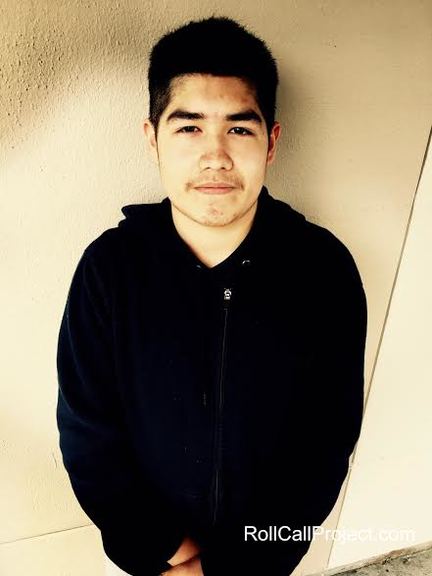 High School Student Hispanic Male Will be the first in his family to go to college Q: What do you have in common with your teachers? A: To me, there are still a lot of things we don't know about our teachers. As students, we go through a lot. We experience things that are either good or bad. We have teachers and our school staff that talk to us, who tell us that everything is gonna be alright and let us know that they are there for us. It is only at the time of disbelief and grief where we share that connection. Most of them may be white and there may be more female than male teachers, but that doesn't matter to me. The connection that I have to my teachers is something else. I also see it with other students as well. We are a small community where we all go to learn, to laugh, to share, and to express ourselves. Teachers are really there to help us no matter how troubled we are, whether we're stuck on a problem or we're going through some troubling times, they are there for us. They laugh and even share some stuff that you never even knew you had in common with. I've also seen some teachers experience the same things that we do too. I see them talk about their personal lives, hear them make jokes. I've also seen some of my teachers at their lowest point. We as a society treat our teachers as machines. We go in, sit down, learn, and move on to the next. But that is not true. We don't truly see what our teachers are. I am truly grateful for the community that I am a part of. Teachers' experiences and knowing the things that we have or may not have in common has helped me do things that I may never have thought I was capable of. Like expressing myself and be able to share my story. Q: Does it matter that students and teachers have things in common? A: I know that it may be hard for others to express themselves and I understand. But all I want for people to understand is that there a lot of things we don't know about our teachers, and it is difficult to make a connection with someone you may not know a lot about. To me, it does matter that students and teachers have something in common. It builds that personal connection. And even though you may or may not have something in common with your teachers, it builds that sense of communication and trust. No matter who we or they are. No matter what race, gender, sexual orientation, or even who you are truly. Having that connection turns a school into a community and makes our teachers and students into a family, no matter if you have something in common or not. Connect with Alexis on Twitter @ASVideoGamer. Photo (c) 2017 Kristin Leong 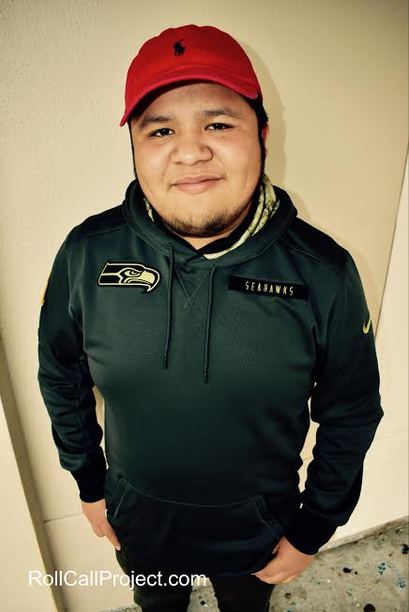 High School Student Hispanic Straight Male Will be the first in his family to graduate from high school Q: What do you have in common with your teachers? A: I think I do have stuff in common with some of my teachers because they tell us their life experiences and I can relate to them. But then there's some teachers that I can't relate to because of their race or their gender because I'm going through different things in life than what they went through. They try helping out, but it's a better help if the person that is trying to help knows what you're going through and knows how you're feeling because they were there at one point. Q: Does it matter that students and teachers have things in common? A: I think it does matter if you and your teachers have things in common. If students and teachers had things in common if you need someone to talk to they are there for you, they know what's going on with you, you have more trust in them, and you can feel like you can open up with them and share your feelings. Gustavo hopes to attend Seattle Pacific University or Washington State University after he graduates. He's interested in studying automotive technology, video production, and photography. Photo (c) 2017 Kristin Leong 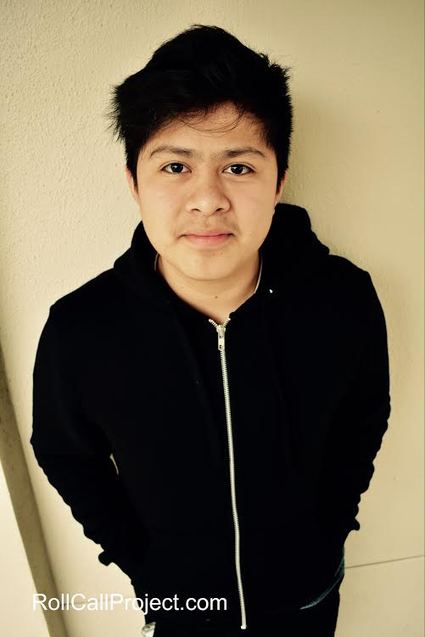 High School Student Hispanic Straight Male Will be the first in his family to graduate from college Q: What do you have in common with your teachers? A: Growing up, I never had anything in common with my teachers. Being a Mexican-American is tough, especially because a lot of us come from families who immigrated to the U.S. We always had to do the extra set of work and help our parents at their work, and it was that struggle that your teachers didn't understand. It wasn’t until I reached high school, for the first time I had a teacher who was Mexican. As soon as he introduced himself to me I knew we were going to get along. Then we began to share the common problems that Mexican children have, the foods that we liked and we even shared the same taste in music, and that's what made me trust him and rely on him whenever I had a question or a problem and that’s when I realized that when you share something in common with someone, especially share the same race, you don’t feel alone, you don't feel outnumbered, you feel relieved that someone finally understands you and your struggles. Q: Does it matter that students and teachers have things in common? A: When sharing a common interest, especially cultural background, it makes you trust that person, so when students and teachers share the same struggle or same taste in music it helps create a connection and that connection turns into trust and trust turns into a friendship. That said, I believe it's beautiful that teachers and students share common interests, but does it matter? No, because although there's no commonality, there is that respect that makes you interact with that person. Roberto plans to study science and engineering in college and start his own software company that will help make sure all children have access to computers. To hear more about Roberto's journey, watch this video of Kristin Leong's opening talk for Town Hall Seattle's #EducationSoWhite event. Photo (c) 2017 Kristin Leong |
ROLL CALLHumanizing the gaps separating teachers and students. Archives
December 2020
Categories
All
|
Proudly powered by Weebly

 RSS Feed
RSS Feed